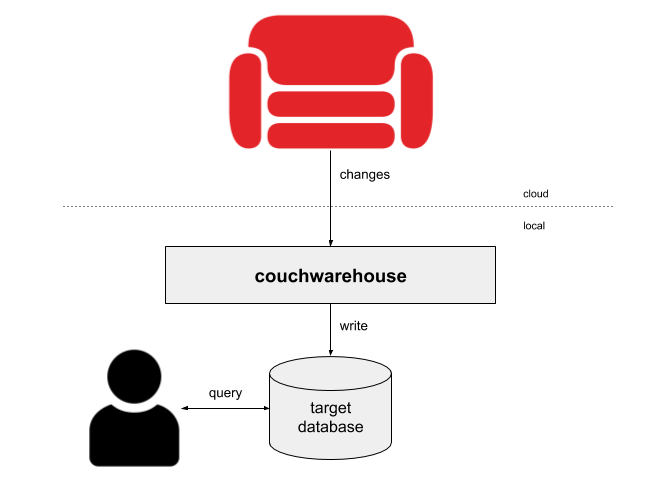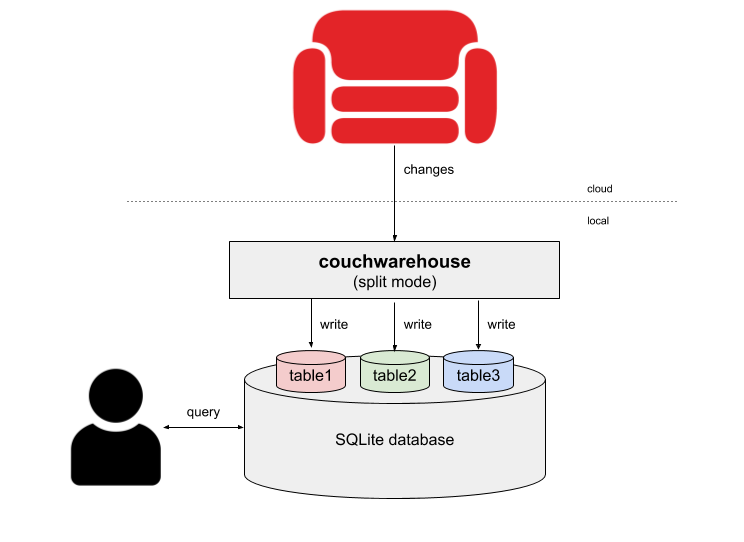couchwarehouse v1.7.1
couchwarehouse
couchwarehouse is a command-line tool that turns your Apache CouchDB database(s) into a local data warehouse. The target database can be either be SQLite, PostgreSQL, MySQL or Elasticsearch.
It works by:
- discovering the "schema" of your CouchDB database (for the relational databases).
- creating a new SQLite, PostgreSQL or MySQL table to match the schema, or in the case of Elasticsearch simply moving the JSON over.
- downloading all the documents (except design documents) and inserting one row per document into the target database.
- continuously monitoring CouchDB for new documents, updates to existing documents and deletions.

Once downloaded your database can be queried using SQL or the target database's API.
Installation
Node.js version 8 or above and npm are required:
npm install -g couchwarehouseUsage with SQLite
By default, your CouchDB installation is expected to be on "http://localhost:5984". Override this with the --url/-u parameter and specify the database name with --database/-db:
$ couchwarehouse --url https://U:P@host.cloudant.com --db mydb
Run the following command to query your data warehouse:
$ sqlite3 couchwarehouse.sqlite
Then in sqlite3, you can run queries e.g.:
sqlite3> SELECT * FROM cities LIMIT 10;
Have fun!
p.s Press ctrl-C to stop monitoring for further changes
downloading mydb [======------------------------] 20% 27.7sAfter downloading is complete, couchwarehouse will continuously poll the source database for any changes and update the local database accordingly.
Press "Ctrl-C" to exit.
Accessing the SQLite data warehouse
In another terminal, simply run the sqlite3 command-line tool (which may be pre-installed on your computer, otherwise download here).
$ sqlite3 couchwarehouse.sqlite
sqlite3> SELECT name,latitude,longitude,country,population FROM mydb LIMIT 10;
name latitude longitude country population
---------------------- ---------- ---------- ---------- ----------
Brejo da Madre de Deus -8.14583 -36.37111 BR 27369.0
Pindaré Mirim -3.60833 -45.34333 BR 22933.0
Moju -1.88389 -48.76889 BR 21510.0
Matriz de Camaragibe -9.15167 -35.53333 BR 18705.0
Fatikchari 22.68768 91.78123 BD 33200.0
Picos -7.07694 -41.46694 BR 57495.0
Balsas -7.5325 -46.03556 BR 68056.0
Jaguaruana -4.83389 -37.78111 BR 21790.0
Pilar -9.59722 -35.95667 BR 30617.0
Patos -7.02444 -37.28 BR 92575.0 SQLite has an extensive query language including aggregations, joins and much more. You may create warehouses from multiple CouchDB databases to create multiple SQLite tables and join them with queries!
N.B if your database name has a - character in it, it will be removed from the subsequent SQL table e.g "month-54" becomes "month54".
Using with PostgreSQL as the target database
The PostgreSQL connection details are gleaned from environment variables. If you're running PostgreSQL locally without password protection, you need only worry about the PGDATABASE environment variable which defines the name of the database the couchwarehouse tables will be created. If left undefined, a database matching your current username will be assumed (e.g. glynnb). I had to create this database first:
$ createdb glynnbbefore running couchwarehouse specifyinhg the --databaseType parameter:
$ couchwarehouse --url https://U:P@host.cloudant.com --db mydb --databaseType postgresqlYou may then run psql locally to query your data:
$ psql
glynnb=# select * from mydb limit 5;
name | latitude | longitude | country | population | timezone | id | rev
------------+----------+-----------+---------+------------+---------------------------+---------+------------------------------------
Fatikchari | 22.6877 | 91.7812 | BD | 33200 | Asia/Dhaka | 6414184 | 1-b463b22510476d1f5a9286654eab306b
Pilar | -9.59722 | -35.9567 | BR | 30617 | America/Maceio | 3392126 | 1-249183b8148fa14c2b203d101dbe19be
Jaguaruana | -4.83389 | -37.7811 | BR | 21790 | America/Fortaleza | 3397665 | 1-93783cc6d4a421f65cc6238275640803
Patos | -7.02444 | -37.28 | BR | 92575 | America/Fortaleza | 3392887 | 1-629bf77b67fa9173670008dabceb178f
Pirané | -25.7324 | -59.1088 | AR | 19124 | America/Argentina/Cordoba | 3429949 | 1-19b66e5364fb1292823e4f9a6c53571d
(5 rows)Using with MySQL as the target database
The MySQL connection string is taken from the MYSQLCONFIG environment variable, or if absent mysql://root:@localhost:3306/couchwarehouse is used. connection details are gleaned from environment variables. You will need to create the couchwarehouse database first:
$ mysql -u root
mysql> CREATE DATABASE couchwarehouse;
Query OK, 1 row affected (0.00 sec)before running couchwarehouse specifyinhg the --databaseType parameter:
$ couchwarehouse --url https://U:P@host.cloudant.com --db mydb --databaseType mysqlYou can then access your datawarehouse from the mysql console:
$ mysql -u root
mysql> select * from mydb limit 5;
+---------------+----------+-----------+---------+------------+---------------------+---------+------------------------------------+
| name | latitude | longitude | country | population | timezone | id | rev |
+---------------+----------+-----------+---------+------------+---------------------+---------+------------------------------------+
| Grahamstown | -33.3042 | 26.5328 | ZA | 91548 | Africa/Johannesburg | 1000501 | 1-d8d38173981fe25cc8592b14c34aa262 |
| Graaff-Reinet | -32.2522 | 24.5308 | ZA | 62896 | Africa/Johannesburg | 1000543 | 1-3256046064953e2f0fdb376211fe78ab |
| Abū Ghurayb | 33.3056 | 44.1848 | IQ | 900000 | Asia/Baghdad | 100077 | 1-101bff1251d4bd75beb6d3c232d05a5c |
| Giyani | -23.3025 | 30.7187 | ZA | 37024 | Africa/Johannesburg | 1001860 | 1-cb3cd8dd58cef68b9e2cebc66eedcc10 |
| Ga-Rankuwa | -25.6169 | 27.9947 | ZA | 68767 | Africa/Johannesburg | 1002851 | 1-685b969148a5534b9cd85689996c52f0 |
+---------------+----------+-----------+---------+------------+---------------------+---------+------------------------------------+
5 rows in set (0.00 sec)Using with Elasticsearch as the target database
The MySQL connection string is taken from the ESCONFIG environment variable, or if absent http://localhost:9200 is used.
Run couchwarehouse specifyinhg the --databaseType parameter:
$ couchwarehouse --url https://U:P@host.cloudant.com --db mydb --databaseType elasticsearchYou can then access your datawarehouse using the Elasticsearch API:
$ curl 'http://localhost:9200/couchwarehouse/_search?q=name:"York"'
{"took":3,"timed_out":false,"_shards":{"total":5,"successful":5,"skipped":0,"failed":0},"hits":{"total":6,"max_score":7.998925,"hits":[{"_index":"couchwarehouse","_type":"default","_id":"4562407","_score":7.998925,"_source":{"name":"York","latitude":39.9626,"longitude":-76.72774,"country":"US","population":43718,"timezone":"America/New_York"}},{"_index":"couchwarehouse","_type":"default","_id":"2633352","_score":7.998925,"_source":{"name":"York","latitude":53.95763,"longitude":-1.08271,"country":"GB","population":144202,"timezone":"Europe/London"}},{"_index":"couchwarehouse","_type":"default","_id":"6091104","_score":5.9267497,"_source":{"name":"North York","latitude":43.76681,"longitude":-79.4163,"country":"CA","population":636000,"timezone":"America/Toronto"}},{"_index":"couchwarehouse","_type":"default","_id":"7870925","_score":5.9267497,"_source":{"name":"East York","latitude":43.69053,"longitude":-79.32794,"country":"CA","population":115365,"timezone":"America/Toronto"}},{"_index":"couchwarehouse","_type":"default","_id":"5128581","_score":5.283532,"_source":{"name":"New York City","latitude":40.71427,"longitude":-74.00597,"country":"US","population":8175133,"timezone":"America/New_York"}},{"_index":"couchwarehouse","_type":"default","_id":"5106292","_score":4.734778,"_source":{"name":"West New York","latitude":40.78788,"longitude":-74.01431,"country":"US","population":49708,"timezone":"America/New_York"}}]}Command-line parameter reference
--url/-u- the URL of the CouchDB instance e.g.http://localhost:5984--database/--db/-d- the name of the CouchDB database to work with =--databaseType/-dt- the type of database -sqlite,mysql,postgresqlorelasticsearch(default: sqlite)--verbose- whether to show progress on the terminal (default: true)--reset/-r- reset the data. Delete existing data and start from scratch (default: false)--transform/-t- transform each document with a supplied JavaScript function (default: null)--split/-s- split a database into multiple tables on this field (default: null)--version- show version number--help- show help
The CouchDB URL can also be specified with the COUCH_URL environment variable e.g.
export COUCH_URL="https://USER:PASS@host.cloudant.com"
couchwarehouse --db mydbTransforming documents
If you need to format the data prior to it being stored in the SQLite database, you may optionally supply
a JavaScript transformation function with the --transform/-t parameter.
Create a JavaScript file, in this case called transform.js:
const f = (doc) => {
// remove the basket array
delete doc.basket
// trim whitespace from the category
doc.category = doc.category.trim()
// combine the title/firstname/surname into one field
doc.name = [doc.title, doc.firstname, doc.surname].join(' ')
delete doc.title
delete doc.firstname
delete doc.surname
// return the transformed document
return doc
}
// export the function
module.exports = fThen instruct couchwarehouse to use the function:
couchwarehouse --db mydb --transform './transform.js' Splitting one CouchDB database into multiple tables
A common CouchDB design pattern is to use a top-level field in the the JSON document to identify the "type" of the document (e.g. type: "person" or type: "order") and two have multiple document "types" in the same CouchDB database. If that's the case, you'll need the --split/-s option which allows you to specify the field you are using - couchwarehouse will create a new table for each type e.g. mydb_person, mydb_order.

Simply specify the top-level field name used to differentiate your document types with the --split/-s parameter:
# instruct couchwarehouse to split on the 'type' field
couchwarehouse --db mydb --split typeOnce the data is imported, you can then query the tables separately or use JOIN syntax to query across tables e.g.
SELECT * FROM mydb_order
LEFT JOIN join mydb_user
ON mydb_order.customerId = mixed_user.id
LIMIT 10Schema discovery
CouchDB is a JSON document store and as such, the database does not have a fixed schema. The couchwarehouse utility takes a look at a handful of documents and infers a schema from what it sees. This is clearly only of use if your CouchDB documents that have similar documents.
Let's take a typical document that looks like this:
{
"_id": "afcc37fbe6ff4dd35ecf06be51e45724",
"_rev": "1-d076609f1a507282af4e4eb52da6f4f1",
"name": "Bob",
"dob": "2000-05-02",
"employed": true,
"grade": 5.6,
"address": {
"street": "19 Front Street, Durham",
"zip": "88512",
"map": {
"latitude": 54.2,
"longitude": -1.5
}
},
"tags": [
"dev",
"front end"
]
}couchwarehouse will infer the following schema:
{
"id": "string",
"rev": "string",
"name": "string",
"dob": "string",
"employed": "boolean",
"grade": "number",
"address_street": "string",
"address_zip": "string",
"address_map_latitude": "number",
"address_map_longitude": "number",
"tags": "string"
}Notice how:
- the sub-objects are "flattened" e.g.
address.map.latitude-->address_map_latitude - arrays are turned into strings
- _id/_rev become id/rev
The keys of the schema become the column names of the SQLite table.
Removing unwanted SQLite tables
Unwanted tables can be easily removed using the sqlite3 prompt:
sqlite> DROP TABLE mydb;The whole SQLite database can be removed by deleting the couchwarehouse.sqlite file
from your file system.
What's the catch?
- you need enough memory and hard disk space to store the entire database on your machine
- conflicted document bodies are ignored
- objects are flattened
- arrays are stored as their JSON representation
- your data needs to be relativelyconsistent. The SQL schema is created from the first document of that type that couchwarehouse sees. If you have documents of the same type whose schema varies slightly across the database, then this may not work. You can, however, use a "transform" function to fill in missing fields and tidy up the data a bit. As of version 1.3, there won't be errors from changes in schema, but couchwarehouse doesn't magically migrate your schema as it changes over time.
Using programmatically
This library can be used programmatically too:
const couchwarehouse = require('couchwarehouse')
// configuration
const opts = {
url: 'https://USER:PASS@host.cloudant.com',
database: 'mydb'
}
const main = async () => {
// start downloading data - wait until changes feed is complete
await couchwarehouse.start(opts)
// query the database
couchwarehouse.query('SELECT * FROM mydb').then((data) => {
console.log(data)
})
}
main()The opts object passed to couchwarehouse.start can contain:
url- the URL of the CouchDB instance e.g.http://localhost:5984database- the name of the CouchDB database to work withverbose- whether to show progress on the terminal (default: true)reset- reset the data. Delete existing data and start from scratch (default: false)split- the attribute to use to split documents into separate tables (default: splitting disabled)
Debugging
Starting couchwarehouse with the DEBUG environment variable set will produce extra output e.g.
DEBUG=* couchwarehouse --db mydb2 years ago
2 years ago
2 years ago
3 years ago
3 years ago
3 years ago
3 years ago
4 years ago
5 years ago
5 years ago
5 years ago
5 years ago
6 years ago
7 years ago
7 years ago
7 years ago
7 years ago
7 years ago
7 years ago
7 years ago
7 years ago